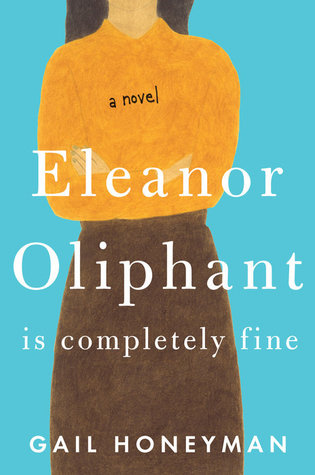by Gail Honeyman

My review of Eleanor Oliphant is Completely Fine by Gail Honeyman
I really enjoyed this book.
Spoilers below:
I read some of the reviews for the book. I was kind of taken aback that some people are completely offended. “Childhood trauma and abuse are not funny”. You’ve misread all of this. No one thinks those things are funny. However, at some point you have to stop taking yourself so seriously. Stop trying to categorize people, and put them into tiny boxes. Her story is believable, not all who suffer as much as her will need intensive therapies. All people heal differently. As far as her not knowing how to order a pizza. It’s clear people can’t seem to evolve past their own perspectives.
Eleanor is like a closed flower, she just needed a little help blooming. It’s beautiful watching her navigate life. She is changing and evolving as we read and it’s rather endearing. She seems to drink to erase the feeling of loneliness, and the pain. Raymond helps to begin to bring her out of her shell. She finds that she doesn’t need to drink as much; she has things to look forward to. I feel like it would be “clique” if they fell in love or got married. However, while she may be developing feelings for him, healthy ones, that are new to her; Eleanor still seems to remain her own person. She tells Raymond no a few times when he asks her to go places. She makes Glen the cat a priority. She is discovering herself. So I don’t think it’s clique at all. Eleanor has been a spectator of life in some ways. She has learned her social strategies by watching the behaviors of others around her, also her “mummy”. So she navigates the world through different eyes. She is careful, and honest, but also introspective.
While Eleanor Oliphant made me very sad for her, she also made me laugh out loud a few times as well. Her brutal honesty… “No thank you,” I said. “I don’t want to accept a drink from you, because then I would be obliged to purchase one for you in return, and I’m afraid I’m simply not interested in spending two drinks’ worth of time with you.” It’s refreshing. She says aloud what most of us are just thinking, but won’t say. In discovering herself, and how her mothers judgements reflected on her; she taught me to think about the way I judge people. We all need to take a lesson from Eleanor about not judging a book by its cover. “Sometimes you’re too quick to judge people. There are all kinds of reasons why they might not look like the kind of person you’d want to sit next to on a bus, but you can’t sum someone up in a ten-second glance. That’s simply not enough time.”
We all began the book judging Eleanor, and her behavior. It is only later when you discover more about her that you warm to her. On the bus, Eleanor points out how she judged a man for wearing no socks who ended up being very kind to her. There is a big lesson here. Eleanor is the outcast in her office. It took Raymond, a kind man, who reached out to her to change that. She was an important person, a needed person, a good worker, all before Raymond, but no one took the time. In reading this book I started to once again recognize the little things we take for granted. It’s the little things that matter the most. “realized that such small gestures – the way his mother had made me a cup of tea after our meal without asking, remembering that I didn’t take sugar, the way Laura had placed two little biscuits on the saucer when she brought me coffee in the salon – such things could mean so much.”